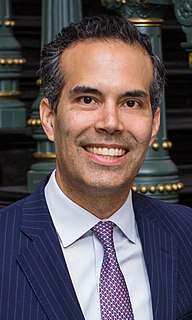A Quote by Henry A. Kissinger
I believe it is a mistake to isolate arms control from other areas of policy.
Related Quotes
I remember talking to, 40 years ago, one of the leading people in the government who was involved in arms control, pressing for arms control measures, détente, and so on. He's very high up, and we were talking about whether arms control could succeed. And only partially as a joke he said, "Well it might succeed if the high tech industry makes more profit from arms control than it can make from weapons-related research and production. If we get to that tipping point maybe arms control will work." He was partially joking but there's a truth that lies behind it.
I'm not optimistic about reform in many, if any, policy areas at all. I think we'll make further progress by inventing new things that aren't much regulated yet and outracing bad policy. I look at so many policy areas - regulation, regulatory reform, health care reform - it's all failing, we're not making improvements, we're going backwards.
Even though you try to put people under control, it is impossible. You cannot do it. The best way to control people is to encourage them to be mischievous. Then they will be in control in a wider sense. To give your sheep or cow a large spacious meadow is the way to control him. So it is with people: first let them do what they want, and watch them. This is the best policy. To ignore them is not good. That is the worst policy. The second worst is trying to control them. The best one is to watch them, just to watch them, without trying to control them.
We could still have continued the arms race, but the arms race was pointless, and it was another reason we decided to start perestroika. It was senseless to continue to accumulate weapons. We had enough weapons to destroy life on Earth 1,000 times, and therefore it was very clear to us that the arms race could spiral out of control. A conflict could have started, as both the Americans and the Soviets realized, not out of a wrong political decision but because of a failure in the command-and-control systems.
































